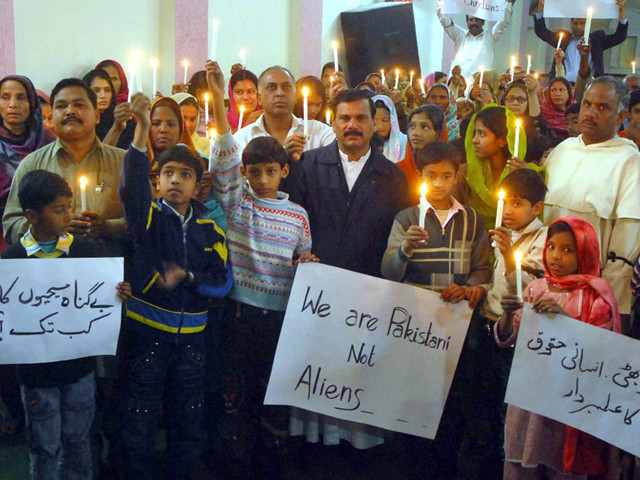Bhatti murder: Christian Lawyers Association speaks out
The protesters carried placards and banners bearing inscriptions demanding the early arrest of the murderer.

Christian Lawyers Association in Pakistan (CLAP) held a protest rally condemning the assassination of minority affairs minister Shahbaz Bhatti on Monday. Supreme Court Bar Association (SCBA) president Asma Jahangir also participated in the rally from the Lahore High Court (LHC) to the Punjab Assembly.
The protesters carried placards and banners bearing inscriptions demanding the early arrest of the murderer and for providing protection to minority communities. Nearly two dozen Christian lawyers participated in the rally along with civil society members and demanded that minority communities be provided with better security.
CLAP president Akbar Munawar Durrani told The Express Tribune that Ms Jahangir had had to leave the protest in the middle to attend a her case fixed before the Supreme Court (SC). Durrani said that Lahore High Court Bar Association (LHCBA) president Asghar Ali Gill was also appearing before the LHC and had been unable to attend the rally.
“Usually the LHCBA and Lahore Bar Association (LBA) show their support by boycotting court proceedings. Their absence shows disregard for the Christian community,” said a protestor who chose to remain anonymous.
Addressing the rally, Durrani said that the murder of Shahbaz Bhatti was a glaring reminder of terrorism, sectarianism and religious extremism.
He said that the murder was a warning, not only for the Christian community, but also for other minorities in the country. He said the assassination of the minorities affairs minister had sent a message that religious extremism had taken root in the country and that the government was unable to ensure protection of citizens’ basic rights. Durrani said that minority communities were being pushed into a corner.
CLAP members demanded that the assassins of Shahbaz Bhatti be arrested as soon as possible. “All discriminatory laws should be abolished,” he said.
“Printing literature against minorities should be banned and propaganda against their religious books needs to come to an end,” he said, adding that the government needed to introduce proper legislation against hate speech targeting minority communities.
“There should be legal action against clerics who issue edicts declaring that members of a minority community deserve to be killed,” Durrani said. Advocate Robinson George Nicholson submitted a resolution in the LHCBA for deliberations over these measures. LHCBA secretary Arshad Malik Awan has fixed a hearing for Tuesday and called a general house meeting of the LHCBA to approve its findings and recommendations.
“Bhatti’s murder has shown that people who speak for minority communities are under threat and can be killed without reason,” Nicholson said. He said that the latest murder had brought stigma to the state and was an insult to the rule of law.
The resolution also demanded Interior Minister Rehman Malik’s resignation.
Published in The Express Tribune, March 8th, 2011.

















COMMENTS
Comments are moderated and generally will be posted if they are on-topic and not abusive.
For more information, please see our Comments FAQ